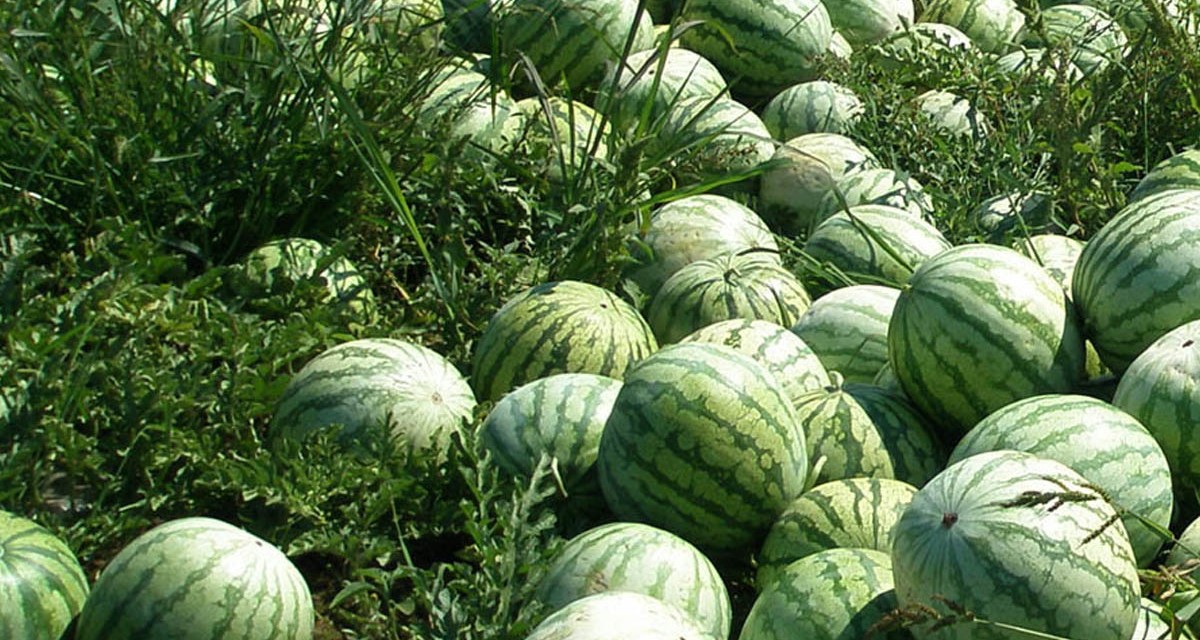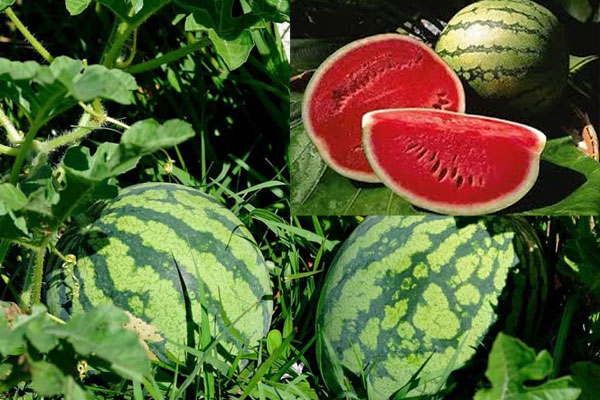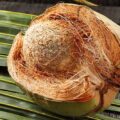When it comes to competition, Nigeria is one of the most profitable countries in the world, which makes it an ideal business place. This is because everything can be bought and sold at a very considerable cost and profit. That is why people are readily investing in business here. In addition, part of the reason the country is so profitable is because of its exports of agricultural produce, particularly watermelons.

Nigeria is blessed with fertile soils, a favorable climate, and abundant fresh water. This makes it ideal for producing many agricultural products, including cereals, fruits, and vegetables.
Agriculture is now becoming a major source of income nationwide. Although watermelon is not a staple crop, it still has a lot of demand in and out of Nigeria. Watermelon is a plant of the genus Citrullus, a variety of melons. This fruit has a green rind and watery flesh that is bright red when ripe and contains black pips.
I like the idea of venturing into the watermelon farm because planting to harvest takes approximately 90days (3 months), so you can plant and harvest up to 4 times a year. China is currently the world’s largest producer of watermelon.
This is a favorable business and can serve as a passive income idea that will generate residual profit for life. That is just the beginning; starting a watermelon farm in Nigeria is cheaper, and most farmers start it up with less than ₦50,000 (expect the land).
The best time to plant watermelons in Nigeria is from November through April, as the weather is favorable at this time of year. A farmer who wishes to start a watermelon business would need to invest in sowing equipment and fertilizer for his crops. He would also need to buy land to grow his produce.
Watermelons are seasonal fruits, so you need to plan for their production in early spring or winter. Failure to do this can lead to a poor harvest (if any).
A watermelon farm is very profitable and has a high turnover; up to ₦400,000 can be made in 3 months on a plot of land (₦1.6m yearly), is resistant to disease, and can adapt to various climate changes. So, as you can see, it has slight and requires no work. And it has an income.
So now that I’ve got your attention let us get down to it. Here is a rundown on.
Some Nutritious Benefits of Watermelon
Watermelon is a highly desirable fruit because of its 92% water content. In addition to this, it contains vitamins A, B6, and C. It also has antioxidants, lycopene, amino acids, and potassium. Watermelon is therefore highly recommended for those who want to stay fit. Getting more water intake in your body is not a bad idea at all.
It also has the rind, loaded with antioxidants that help fight free radicals, thus preventing many diseases such as cancer. It plays a significant role in keeping one’s bones healthy. Watermelon also helps to detoxify the body by eliminating harmful substances from the body. Therefore, we must eat at least a slice of watermelon every day to ensure that our bodies stay fit and functional.
Essential Business Opportunities Found In Watermelon Farming Business
Watermelons are some of the most delicious fruits God has ever given us. Watermelons have been a blessing for many worldwide, from how they quench our thirst when we’re hot to their healing properties. There are plenty of fantastic opportunities for anyone willing to take the plunge and get started.
Food Provision: Although watermelons are not in a class of high-valued fruits, their business ventures are remunerating. Watermelons are eaten as raw fruits by numerous people around the world. They can be cut into small pieces and included as part of food or even prickled with chilly cold beverages such as soda, fresh juice, and water. You can sell them directly to wholesalers, retailers, and even consumers who will eat them. This process ensures maximum profit.
.Beverages: The juicy constituent of watermelons has many uses. It can be eaten by drinking it, blending it with other vital fruits, or being used as a flavor in liquor and wines. All these products are well received in the market, especially in summer. This can be sold as packaged and branded products from your store or home.
Basic Facts About Watermelons

Watermelons are delicious, refreshing, and full of vitamin C. But how much do you know about watermelons? Are you watermelon enough to pass the test? Find out more about this summer fruit in these basic facts about watermelons.
- Watermelon has a high amount of water. Watermelon’s high water content also helps to reduce blood pressure by transporting excess fluid out of your body through urine.
- Watermelons were initially grown in Africa and parts of Asia.
- Watermelons have a small amount of fat.
- The fruit contains vitamins A and C, potassium, magnesium, and amino acids.
- Watermelon is an extremely good source of lycopene. Lycopene is a carotenoid found in tomatoes, red grapefruit, and watermelon. Lycopene is essential in preventing prostate cancer, promoting heart health, and helping prevent heart disease. Lycopene may also help prevent macular degeneration.
- Watermelons are high in fiber, which helps maintain bowel regularity and lowers cholesterol levels. The fiber content offers various health benefits, such as encouraging a healthy digestive system.
- Lloyd Bright of Arkadelphia, Arkansas, grew the world’s heaviest watermelon in 2005. It weighed 268.8 lbs. (121.93 kg).
- It’s also a little-known fact that watermelons can decrease your body temperature and blood pressure.
How To Start Watermelon Business In Nigeria From Farm To Market
-
Pre-planting procedures For Watermelon
These involve all activities carried out before the seed gets into the ground. And they include
-
Seed Selection
This is one of the most vital actions when starting a watermelon farm in Nigeria. There are a series of seeds you can choose from Depending on the variation, watermelon species, and taste. These seeds/breeds vary in shape, color, size, taste, and texture. The most common sorts include:
1. Sugar Baby –
Sugar Baby Watermelons are a unique variety of sweet watermelons. This hybrid is smaller than most common varieties and has ice-box sizes. Sugar Baby watermelon goes well with salads and can be served as a starter. This is the most common of them all. The sugar baby usually weighs 4 kg within 75 days and has sweet red flesh.
- Crimson Sweet –
The crimson sweet watermelon is a hybrid variety comparable to the sugar baby watermelon. It’s often known for its large size and massive seeds. The flesh of the crimson sweet watermelon is usually bright red and tastes sweeter than other watermelons.
The crimson sweet variety usually takes between 85-95 days to fully mature, which is about three weeks longer than the average sugar baby watermelon. This variety weighs anywhere between 15-25kg.
- Charleston Gray –
It grows to an average height of 1.46 meters and has a maximum weight of 25 kilograms. The Charleston gray watermelon matures to an average time frame of 85 days, with an average harvest period between May and June. Its flesh is usually red but fiber-free, and its rind is usually grey-red with the usual sweet red flesh.
- Orangeglo Golden Midget –
This is one of the most significant species of watermelon. It weighs 18 kg and takes about 90 days to mature. It is very sweet and crispy and has bright orange flesh and white seeds.
- Jubilee –
This is another fantastic breed of watermelon. It weighs 18 kg when matured, takes at most 95 days, and has the usual sweet red flesh inside. Other recognized species are
- Green gold
7. Icebox
8. Kaplan
9. Sweet beauty
10. Sangria
2. Site Selection
After seed selection, site selection is another crucial factor to consider is the site. There are 36 states in Nigeria and abundant land. When you get your land, examine the weather, topography, and soil type, and survey the area for security, labor, market, etc. Once you’ve done this, you move on to your business plan.
-
Business plan
Failing to plan is planning to fail. That is why most farmers make losses instead of gains. You should draw a business plan. This will also help you get assistance and sponsorship. Your business plan should include your budget, expenses, expenditure, potential income, and possible partners.
-
Land preparation
The last step before you plant your first seed is land preparation. This step determines your crop yield, including weeding and stumping, applying manure and fertilizers, plowing, harrowing, and ridging. Once this is done, you’ll have a smooth planting.
-
Planting Procedures For Watermelon
These involve all activities carried out immediately after land preparation and all activities that occur before the fruit is harvested. They include
-
Planting Watermelon
Watermelon is a crawler and produces a lot of vine during growth, requiring a lot of space. Place a seed an inch into the soil, take two steps forward, and place the next seed.
-
Watering
It is essential to water the plants sufficient twice a week. So the growing plants can have ample space to yield 100%
-
Weeding and Pest Control
You can use either herbicides or the manual hand-picking method for the weeds. And for insects and other pests, applying pesticides is not advised. So, you should introduce their natural predators.
-
Harvesting Procedures For Watermelon
These activities happen after the watermelon seeds have ripened and are ready to be harvested. They include
-
Harvesting
As I previously stated, there are different species, but watermelon reaches maturity between 75-90 days.
With the dull sound, the base of the water turns from green to a dull yellowish color, and the stem losses its moisture and spiral. These signs prove that the fruit is ready for harvest.
Before harvesting your fruit, make sure you take some to market and stores and give out free samples if need be to create demand for it.
-
Storage
Watermelon can be preserved for up to 2 months without going stale if the optimal temperature is between 11°C and 15°C, 85 to 95% optimal humidity 85 to 95%, isn’t exposed to direct sunlight after harvest, and piled with other fruits and/or vegetables.
-
Marketing
You can sell you watermelons as a wholesaler to fruit stands, grocery stores, supermarkets, restaurants, hotels, pharmaceutical companies, or individuals and even export it to other countries.
Let’s take a look at the expenses and profits.
Expenses and Profits Of Watermelon Farming Business In Nigeria
Expenses on a plot of land
- 500 grams of imported hybrid seeds – ₦5,300
- Labor cost for planting and harvesting – ₦5,000
- Labor cost for weeding and manure applications – ₦5,000
- 50kg of Organic Manure – ₦3,500
- Foliar fertilizer – ₦5,200
- Transportation – ₦3,000
- Miscellaneous – ₦10,000
It sums up to ₦38,000 as the estimated/probable expenditure to run this program.
Profit
A plot of land can grow up to 1,596 melons.
The average price of a watermelon is ₦250 (Wholesale price)
1,569 X 250 = ₦392,250
Profit = ₦392,250 – ₦45,000
This nets you a profit of ₦347,250 every three months and ₦1.4m annually. In case you don’t know, The price for watermelons for export is twice that higher. Take a moment to do the maths.
By now, you should be able to start a watermelon business in Nigeria from farm to market and awaken the entrepreneur in you. I’m sure I have covered every step and procedure to start a watermelon business in Nigeria from Farm to Market. If I missed any or you would like to share your knowledge, do tell me in the comment section below.
Conclusion
Starting a profitable watermelon farming business in Nigeria will be one of the best decisions you will ever make. You have also seen the number and variety of activities you will undertake as a farmer. And if you are serious about exploring this business, then you are already aware of the benefits you can get from it. You’ve learned so much in this article. Summing up, you can be sure that starting a watermelon farming business in Nigeria can give you a lot of benefits if only you put effort and resources into it.










Leave a Reply